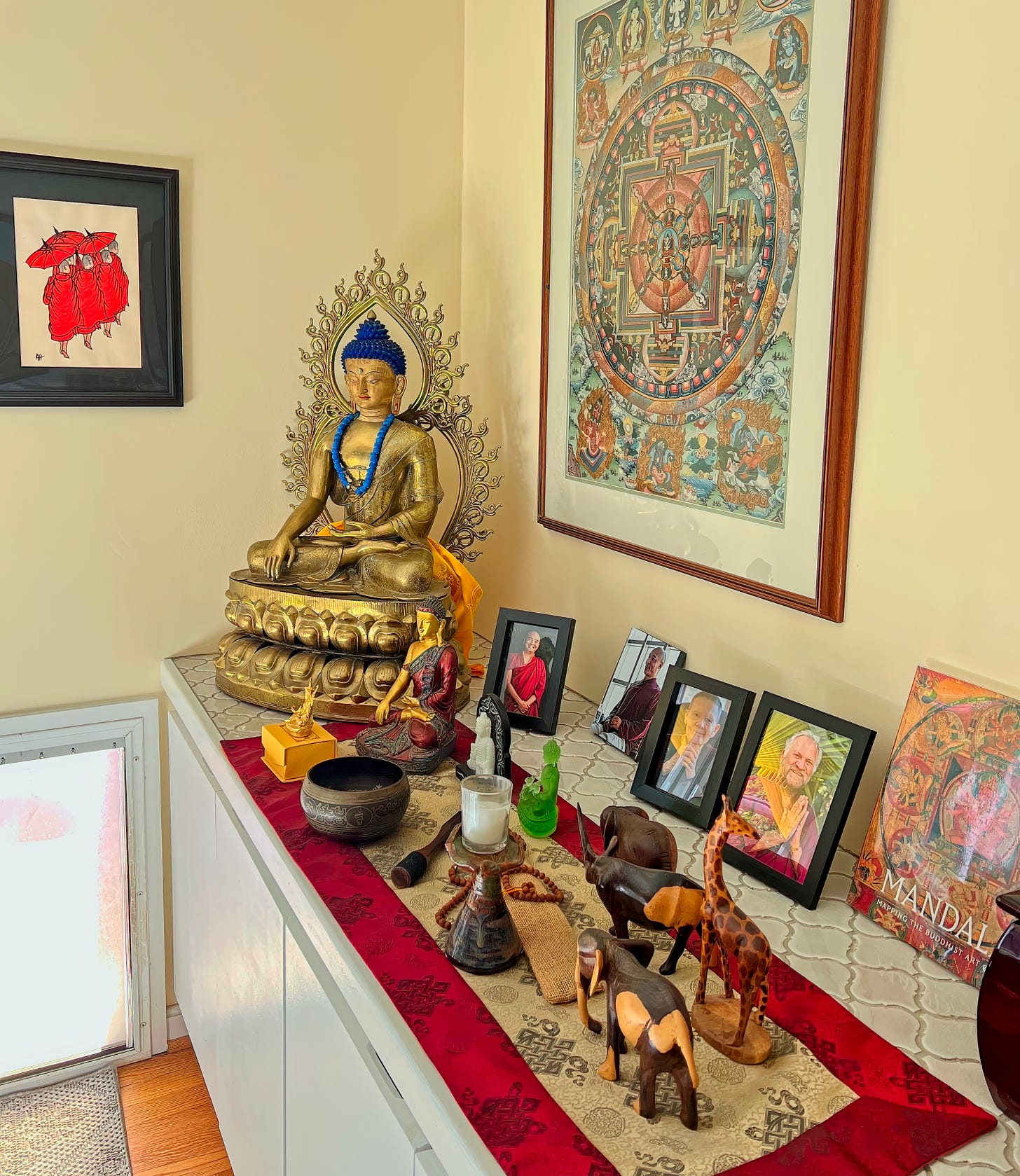As a Buddhist blogger, it’s essential to maintain my equanimity. I know that life is perfect as it is because it is shaped by causes and conditions, and there could be no other way. And I know that every moment is impermanent—those I like and those I’d prefer not to live through. So I take everything in stride and hope to pass that state of mind on to readers and listeners.
As an American voter, I’m concerned about what seems to be a pivotal crossroads for the United States. On November 5, we will elect our next president.
One candidate is a megalomaniac who admires fascistic leaders and holds some minorities to blame for not making America great in the way he thinks it should be. He learned from his previous time in office that he won't get his way if he appoints staff members with principles. He won’t make that mistake again. We can’t be as sure about how the other candidate will govern, but she has run a campaign aimed at uniting us—a campaign respecting all Americans and the aspirational ideals on which the nation was founded.
One would think the choice would be a no-brainer, but surveys indicate that American opinion is divided down the middle—roughly 50% of us for each candidate. Many of those who support Donald Trump feel overwhelmed and ignored by intellectual elites on the other side who seem to have engineered a perilous cultural change in recent generations. They disdain the intellectual elites and don’t see Trump’s megalomania as a great threat. Many of those who support Kamala Harris disdain the MAGA (Make America Great Again) crowd and see anyone who opposes her as a sexist, a racist, a Christian Nationalist, or all of the above.
There are indications that people in each camp are unwilling to change their minds. What has brought us to this potentially tragic impasse?
An extensive report on how we got here and—politically speaking—what we can do about it was published on October 11 and has been widely quoted. Called Politics Without Winners: Can Either Party Build a Majority Coalition? it begins:
In the American political system, the parties’ purpose is to form enduring national coalitions. Look at almost any point in American history, and you will find a majority party working to sustain a complex coalition and a minority party hoping to recapture the majority. Today, however, American politics features two minority parties, and neither seems interested in building a national coalition. Close elections and narrow majorities dominate electoral politics more than at any other point in American history.
For those interested in exploring the issue from a political perspective, I recommend The Idiot’s Guide to Dominating American Politics, a Substack post by Yascha Mounk, who asks:
Has something in America changed, such that it is no longer possible to build broad and stable majorities? Or could one of the two parties, perhaps taking inspiration from the leaders that set previous partisan realignments into motion, succeed in putting together such a dominant coalition?
Mounk’s answer is yes, but I’m more interested in the spiritual aspect of the question. A clue to that answer comes from David Brooks, who writes mainly on politics but often ties political trends to deep social issues. In Why the Heck Isn’t She Running Away With This? he writes:
I think the reason for all this is that political parties no longer serve the function they used to. In days gone by, parties were political organizations designed to win elections and gain power. Party leaders would expand their coalitions toward that end. Today, on the other hand, in an increasingly secular age, political parties are better seen as religious organizations that exist to provide believers with meaning, membership and moral sanctification. If that’s your purpose, of course you have to stick to the existing gospel. You have to focus your attention on affirming the creed of the current true believers. You get so buried within the walls of your own catechism, you can’t even imagine what it would be like to think outside it. [Emphasis added]
We come once again to the growing isolation experienced by many, especially in the West, and the declining role of religious organizations. As I’ve said before, we need more options to fill the gap left by doctrinaire Western religions, and some Eastern religions could do it. They are, without doubt, better alternatives than political parties.
Buddhism has a nuanced concept of evangelism. You might call it evangelism with mettā (loving-kindness and a good-natured attitude). Bodhicitta, a deep desire to relieve suffering and spread enlightenment for all beings, is part of our path, which we walk in the spirit of mettā. Here’s what Telling Secrets, an Episcopal blog, says about Buddhist evangelism:
It's just my observation, but I think Christians could learn a great deal from Buddhists about evangelism.
They don't do it. They live it.
It's not about getting people to "join" them. It's about living it. It's not about the Wat or The Temple. It's about your home and your family.
I couldn’t say it better.
What we can learn from Christians, though, is to be more open about our practices and beliefs—always with mettā, respecting the beliefs, or nonbeliefs, of others.
It’s a step we can take to relieve suffering and maybe lessen political polarization, too.
From the Pure Land has hundreds of subscribers in 30 U.S. States and 12 countries. The podcast has listeners in 26 countries. Consider:
If you are not already a subscriber, please become one. Free and paid subscribers receive the same content, but subscribing for $5 a month or $50 a year helps support my mission.
Making a one-time gift of any amount.
Sharing this post with a friend.
Listening and subscribing to the From the Pure Land podcasts via your favorite app or clicking here.













Share this post